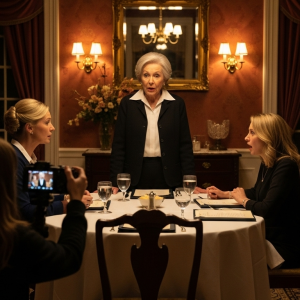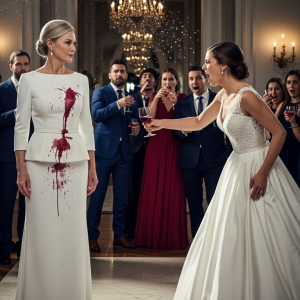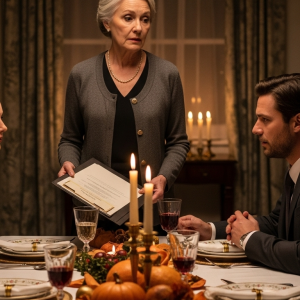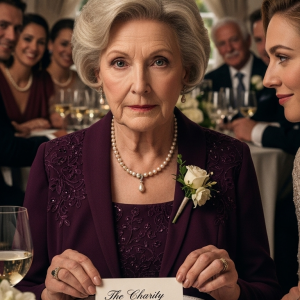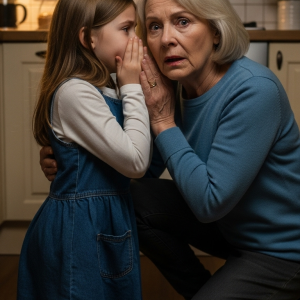“Can you stand by the bathroom wall? We don’t want you to ruin the wedding photos with your age.”
My new daughter-in-law, Brittany, said it with a perfectly sweet smile as she adjusted her veil. I looked at her, then at my son David, who was laughing with his best man, oblivious. In that moment, something inside me, something that had been bending for thirty-six years, finally snapped.
It wasn’t a loud, messy break. It was a quiet, clean fracture. I smiled back at her, picked up my elegantly wrapped gift from the table, and walked straight out of that reception hall. When they discovered what was really inside that box, the frantic phone calls would begin.
Before you judge me, you need to understand. What happened that day wasn’t just about a rude comment. It was about a lifetime of sacrifice being met with casual cruelty. At sixty-four, I thought I’d seen the worst of what family could dish out. I was wrong. But I was also, finally, ready to fight back.
Three weeks before the wedding, I was standing in a corner market, counting out change for a can of soup and crackers. I had $23.47 to my name until my next Social Security check. I’d already drained my small savings on a dress for the wedding and a set of crystal wine glasses I’d seen Brittany admire online—the kind of gift a mother buys because she wants her son’s wife to feel loved.
“Lottery jackpot’s up to sixty-two million,” the kid behind the counter said. I almost laughed. Sixty-two million felt like a number from another planet. But then I thought of Brittany showing off her new designer handbag while I ate the cheapest thing on the menu at our last family dinner. I thought of David casually suggesting I downsize my tiny apartment because “older people don’t need much space.”
A spark of defiance lit inside me. “I’ll take one ticket,” I heard myself say. “Quick pick.”
I folded the small slip of paper—7, 14, 21, 35, 47, and Powerball 9—and tucked it in my purse. It was a foolish, five-dollar bet against a lifetime of being made to feel small. My husband, Harold, would have called me a fool. But Harold was gone, and I had already lost nearly everything that mattered anyway.
I watched the lottery drawing on Saturday night, alone in my studio apartment. When the numbers appeared on the screen, my world stopped. 7… 14… 21… 35… 47… Powerball 9. It wasn’t a mistake. I, Martha Williams, a woman who ate soup for dinner to afford a wedding gift for her ungrateful children, had just won sixty-two million dollars.
My first instinct was to call David, to share the impossible news. But I stopped, my hand hovering over the phone. Instead, I placed the ticket in my jewelry box. Suddenly, I had a very different kind of wedding present in mind.
In the two weeks that followed, I quietly built a new life. After taxes, the lump sum was $38.4 million. I met with financial advisors. I bought a sensible car. And then I bought a house—a sprawling, $2.8 million oceanfront home with floor-to-ceiling windows overlooking the Atlantic. I was a cash buyer. The sale closed in record time.
My final stop was the bank. I had a cashier’s check prepared for three million dollars, payable to David and Brittany Williams. The deed to the beach house and that check were wrapped in a beautiful white box with a silver ribbon. This was my real gift. It would solve all their financial struggles. It would, I fantasized, finally make them see me as a blessing instead of a burden. I should have known better than to expect gratitude from people who had never learned to be grateful.
The wedding day arrived. I wore my new navy-blue dress, feeling a nervous excitement. Today, I would transform from the struggling mother-in-law into the generous benefactor who would change their lives.
The ceremony was beautiful. David looked handsome; Brittany was radiant in a gown that cost more than my annual income. At the reception, I was seated at a table in the back, with distant relatives. I watched my son dance with his new wife, glancing at the gift table where my white box sat, holding their future.
That’s when Brittany approached, her smile perfect. “Martha, could I ask you a tiny favor?” she began. “The photographer wants to take some family photos by the entrance, and the lighting is just perfect.”
She paused, her smile never wavering. “But the thing is… can you stand by the bathroom wall? I mean, with your age and everything, we’re trying to keep the photos looking young and fresh for social media. You understand, right?”
The words landed like a punch. The conversation at my table stopped cold. I could feel every eye on me. She had just called me too old and ugly for her precious photographs, and she’d done it with a smile.
“I understand perfectly,” I said, my voice dangerously calm. I stood up, walked to the gift table, and picked up my white box. I walked past the shocked faces, past the photographer, and past my son, who was adjusting his tie, completely oblivious. I walked out of that reception hall carrying the keys to their dream life and three million dollars in cash. And for the first time in years, I felt powerful.
The first call came at 8:30 p.m. It was David, his voice confused. “Mom? Brittany said you left early. Are you okay?”
“I’m feeling better than I have in years, actually,” I said, sipping a cup of tea in Harold’s old armchair.
“But you missed the cake cutting! People were asking where you went. Brittany feels terrible, she’s worried she did something wrong.” Apparently, she hadn’t mentioned the part about banishing me to the bathroom wall.
“Tell Brittany not to worry,” I said. “I’m sure she’ll understand everything soon enough.” I hung up.
The next call was from Brittany, her voice dripping with artificial concern. “Martha, I’m so sorry if I upset you. You know how crazy weddings are. I just hate to think…”
“Brittany,” I interrupted. “Did you ask me to stand by the bathroom wall so I wouldn’t ruin your photos with my age?”
A beat of silence. “Well, I… I was trying to arrange people by height… and the lighting was better there… It wasn’t about you personally.”
“You’re right,” I said calmly. “I am being too sensitive. Thank you for the reminder.”
“So you understand!” she said, relieved. “You’ll come to the gift opening tomorrow? We’re doing it at our place around noon.” She was already thinking about the presents.
“I wouldn’t miss it,” I said. And I meant it.
The next day, I arrived at their house holding a different gift. The original white box was locked safely away. Their living room was filled with family, all buzzing about the wedding. They opened presents: expensive appliances, artwork, luggage. My crystal wine glasses were met with polite enthusiasm.
Then I stood up. “Actually, I have one more gift for you both.” I handed them a small box. Inside was a single key and a folded piece of paper.
David held up the key, puzzled. “What’s this to, Mom?”
“It’s the key to my new apartment,” I announced to the silent room. “The address is on the paper. I realized after yesterday that I needed to start thinking about my own future. I used some of Harold’s life insurance money.” Not technically a lie. A lottery win was an emergency of a different sort.
David unfolded the paper. “Ocean View Towers? Mom, that’s the expensive high-rise downtown. How could you afford that?”
I saw the look that passed between him and Brittany. It wasn’t concern. It was calculation. They were rapidly recalculating my net worth and what it meant for their financial future. Their personal ATM had just made a major, unauthorized withdrawal.
“Well,” Brittany said, her voice a little too bright, “I think that’s just great. Independence is so important.” I smiled and settled back into my chair. The real show was just beginning.
The weeks that followed were a cold war of manipulation. They hired a private investigator to trace my sudden wealth. They called with feigned concern, asking about my will, my beneficiaries, my long-term care insurance. They were no longer trying to be subtle.
The final confrontation was triggered by a lie. A text from Brittany: Martha, David is in the hospital. Please call immediately. I called the hospital directly. He wasn’t there. When I called her back and exposed the lie, the mask finally slipped.
“You winning the lottery affects more people than just you!” she shrieked. “We’re family! We’ve been counting on you! You can’t just cut us out because of one stupid comment!”
“You’re right, Brittany,” I said, standing on the deck of my beach house, watching the waves roll in. “It’s not fair to punish you for one comment. I’m punishing you for four years of treating me like an ATM with legs. For raising my son to believe his mother exists only to solve his problems. For assuming a blood relation gives you a right to my money, but not an obligation to treat me with basic human decency.”
“You need us more than we need you,” she sneered. “You’re a sixty-four-year-old woman with no family except us. What are you going to do with all that money? Sit alone in your fancy house until you die?”

I smiled. “Actually, Brittany, I have plans. Big plans. Plans that were going to include you and David, right up until you asked me to stand by the bathroom wall.”
The final call came the next morning. It was David, his voice hollow. Their investigator had found the deed transfer for the beach house. “Mom, please,” he begged. “Can we just talk? Face-to-face.”
“I’m afraid that’s not possible, David. People who think I’m too old for family photographs don’t get invited to my home.”
“So you’re cutting us off completely?”
“No, David. I’m just giving you what you deserve. But since you’re so curious, do you want to know what your wedding present was actually going to be?”
A long silence.
“I wrapped up the deed to this house and a cashier’s check for three million dollars,” I said, my voice steady. “I was going to give you everything. I spent weeks fantasizing about your joy, your gratitude. But instead, your wife decided I was too old for her pictures. And you, David, you stood there and let it happen.”
I could hear him sobbing on the other end of the line.
“So here’s what’s going to happen now,” I concluded. “I’m keeping the house, the money, and my dignity. You’re keeping the crystal wine glasses and the memory of what you chose when you had to pick between respecting me and getting a good photo.”
“And David? If you’re ever ready to have a relationship with your mother that isn’t based on her bank account, you know where to find me. I’ll be the old woman sitting on her private beach, living her best life.”
I hung up the phone. I walked out onto my deck, looked at the endless ocean that was now mine, and smiled. Sometimes, the best revenge isn’t getting even. It’s getting everything.
The silence that followed my final phone call was more profound than I had expected. For the first few days, I kept waiting for the other shoe to drop—for a car to pull into my long, gravel driveway, for an angry letter to appear in my mailbox, for some desperate, dramatic gesture. But nothing came. The quiet was absolute, broken only by the sound of the ocean waves crashing against my private shore.
I spent those first weeks in a state of surreal peace. I had breakfast on my deck every morning, watching the sun rise over the Atlantic. I walked on the beach, letting the salt spray wash away the years of feeling small and overlooked. I swam in my infinity pool and read books in a sun-lounger, finally understanding that my time was truly my own. The money was an incredible tool, but the true luxury was the freedom from their expectations, the release from the constant, low-grade humiliation of being needed but never wanted.
I didn’t seek out news of them, but news has a way of finding you. It came in the form of a phone call from Great-Aunt Helen, the one who had gasped at the wedding. After the requisite pleasantries, her voice dropped to a conspiratorial whisper.
“Martha, I just thought you should know,” she began. “They sold the house. David and that… wife of his. Couldn’t make the mortgage payments, I hear. The whole thing has been a terrible mess.”
I remained silent, letting her fill the space.
“Brittany is telling everyone a dreadful story,” Helen continued, her voice thick with disapproval. “She’s saying you had some sort of breakdown after Harold died, that the lottery win made you unstable. She claims you’re a vindictive, cruel woman who abandoned her only son in his time of need.”
A year ago, those words would have shattered me. Now, they felt like nothing more than the buzzing of a distant fly. The narrative she was spinning was for her audience, for the friends and family whose approval she so desperately craved. It had nothing to do with me. I was no longer a character in her story.
“And David?” I finally asked, my voice even.
Helen sighed. “He’s a ghost, Martha. He lost his job—something about his performance slipping. They’re living in a small apartment now, and from what I hear, the fighting is constant. He made his bed, I suppose, but it’s a sad thing to see.”
After the call, I stood looking out at my vast, peaceful ocean view. I felt a pang, not of guilt, but of a deep, lingering sorrow for the boy I had raised. I had given him everything except, it seemed, a spine. But his weakness was not my cross to bear any longer. My revenge was complete, but my purpose, I was discovering, was just beginning.
I had not been lying to David. The Williams Foundation for Elder Justice was real. I had hired a small, sharp legal team and a compassionate director, and we had quietly opened an office in the city. Our mission was simple: to provide legal and financial protection for seniors being exploited by their own families.
Our first case came from the most unexpected source. It was Mrs. Peterson, Brittany’s grandmother, a kind, elegant woman who had always treated me with warmth. She had found our foundation’s number through a seniors’ network, having no idea I was the one behind it. She sat across from me in our modest office, her teacup rattling in its saucer as she spoke.
“It’s my children,” she confessed, her eyes filled with a familiar pain. “Since my husband passed, they’ve been… insistent. They say my house is too big for me, that I should sell it and let them ‘manage’ my finances. They want me to move into a facility, but Martha, I’m perfectly healthy. They’re treating me like I’ve already lost my mind.”
It was the same playbook. The same gentle, gaslighting language designed to strip away autonomy under the guise of love and concern. She explained that Brittany’s parents were pressuring her to sign over power of attorney, and Brittany herself had called to say it was “for the best.”
I looked at this woman, a pillar of her family, now being treated like a piece of inconvenient furniture, and my resolve hardened into something unbreakable. The patterns of abuse, I realized, were generational. Brittany hadn’t just learned her cruelty on her own; she was a product of it.
“You came to the right place, Mrs. Peterson,” I said, my voice firm. “We’re going to help you.”
Through the foundation, we provided her with one of the best elder law attorneys in the state. He immediately put a stop to her children’s financial inquiries and established a rock-solid trust that protected her assets, ensuring she could never be forced from her home or have her finances controlled against her will. She was safe.
A few weeks later, she invited me for tea on the deck of my beach house. We sat in the warm afternoon sun, two women from different sides of a fractured family, now bonded by a shared experience.
“You know,” she said, setting down her cup, “I heard from David last week.”
I kept my expression neutral.
“He didn’t ask for money,” she clarified, a note of surprise in her voice. “He called to apologize. He said he was ashamed of how he behaved, not just towards you, but in general. He said watching his marriage to Brittany fall apart after the money disappeared made him realize he’d built his life on all the wrong things.” She looked at me, her eyes kind. “He asked if you were okay. He sounds… lost, but like he’s finally starting to look for the right map.”
I didn’t know what to say. A flicker of the old maternal instinct, the urge to soothe and to fix, rose in my chest, but I pushed it down. His journey back to himself had to be his own.
That evening, long after Mrs. Peterson had gone, I stood by the water’s edge as the tide came in. I had won the lottery, yes. But my real fortune wasn’t the numbers in my bank account. It was the peace in my home. It was the strength to protect another woman from the fate I had so narrowly escaped. And it was the faint, unexpected glimmer of hope that, far away, my son had finally begun the long, arduous work of earning his own. The greatest gift I had ever given him, it turned out, wasn’t the one in the white box. It was the silence, the distance, and the space to finally grow up.
